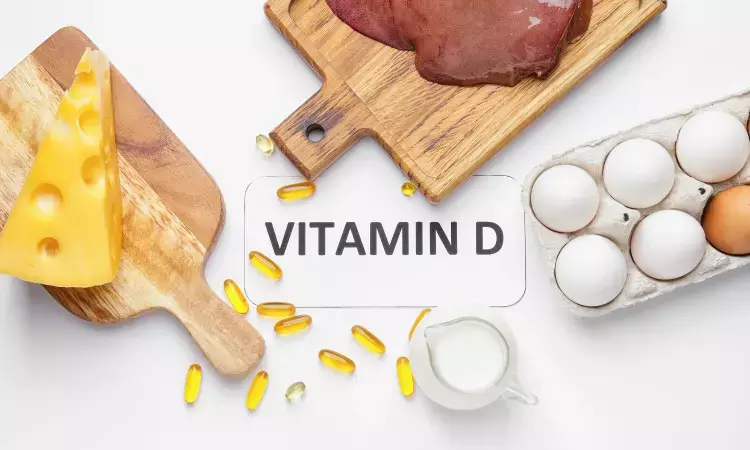- Home
- Medical news & Guidelines
- Anesthesiology
- Cardiology and CTVS
- Critical Care
- Dentistry
- Dermatology
- Diabetes and Endocrinology
- ENT
- Gastroenterology
- Medicine
- Nephrology
- Neurology
- Obstretics-Gynaecology
- Oncology
- Ophthalmology
- Orthopaedics
- Pediatrics-Neonatology
- Psychiatry
- Pulmonology
- Radiology
- Surgery
- Urology
- Laboratory Medicine
- Diet
- Nursing
- Paramedical
- Physiotherapy
- Health news
- Fact Check
- Bone Health Fact Check
- Brain Health Fact Check
- Cancer Related Fact Check
- Child Care Fact Check
- Dental and oral health fact check
- Diabetes and metabolic health fact check
- Diet and Nutrition Fact Check
- Eye and ENT Care Fact Check
- Fitness fact check
- Gut health fact check
- Heart health fact check
- Kidney health fact check
- Medical education fact check
- Men's health fact check
- Respiratory fact check
- Skin and hair care fact check
- Vaccine and Immunization fact check
- Women's health fact check
- AYUSH
- State News
- Andaman and Nicobar Islands
- Andhra Pradesh
- Arunachal Pradesh
- Assam
- Bihar
- Chandigarh
- Chattisgarh
- Dadra and Nagar Haveli
- Daman and Diu
- Delhi
- Goa
- Gujarat
- Haryana
- Himachal Pradesh
- Jammu & Kashmir
- Jharkhand
- Karnataka
- Kerala
- Ladakh
- Lakshadweep
- Madhya Pradesh
- Maharashtra
- Manipur
- Meghalaya
- Mizoram
- Nagaland
- Odisha
- Puducherry
- Punjab
- Rajasthan
- Sikkim
- Tamil Nadu
- Telangana
- Tripura
- Uttar Pradesh
- Uttrakhand
- West Bengal
- Medical Education
- Industry
Can vitamin D halt progression of ovarian cancer?

Japan: A new study published in Matrix Biology suggests that ovarian cancer (OvCa) spread is mostly mediated by mesothelial cells (MCs), and vitamin D-induced peritoneal repair and normalization of thrombospondin-1 expression may be a novel approach to halting OvCa propagation.
A deadly gynecological disease called ovarian carcinoma spreads to the peritoneum. In the abdominal cavity, mesothelial cells function as barriers that stop cancer cells from sticking to one another. However, people with OvCa, undergo a mesenchymal shift and become cancer-associated mesothelial cells (CAMs), which creates a favorable milieu for tumors to encourage spread. There haven't been many attempts to return CAMs to their former condition, though. Here, Kazuhisa Kitami and colleagues examined whether vitamin D prevented the OvCa from spreading both in vitro and in vivo by inhibiting the mesenchymal transition and restoring MCs.
Utilizing both in vivo and in vitro coculture techniques as well as a xenograft model, the impact of vitamin D on the mutual connection of MCs and OvCa cells was assessed in this study.
The key findings of this study were as follows:
1. Vitamin D replenished the CAMs, and it was shown that the extracellular matrix protein thrombospondin-1, which is clinically linked to a poor prognosis and is significantly expressed in peritoneally metastasized OvCa, encouraged the adhesion and proliferation of OvCa cells.
2. Through Smad-dependent TGF- signaling, TGF-1 produced by OvCa cells increased thrombospondin-1 expression in CAMs.
3. Through vitamin D receptor/Smad3 competition, vitamin D hindered mesenchymal transition in MCs and decreased thrombospondin-1 expression, which helped to significantly reduce peritoneal dissemination in vivo.
4. Importantly, in preclinical models that resemble malignant peritonitis in vivo, vitamin D reversed CAMs from a stable mesenchymal state to the epithelial state and normalized thrombospondin-1 production.
In conclusion, when taken as a whole, the findings point to MCs as important dissemination-determining factors and provide a potential strategy for peritoneal dissemination reduction by preventing the contact between OvCa cells and MCs. Researchers hypothesize that repurposing vitamin D may be a potential method for OvCa dispersion, restoring the peritoneum, and restoring normal THBS-1 expression.
Reference:
Kitami, K., Yoshihara, M., Tamauchi, S., Sugiyama, M., Koya, Y., Yamakita, Y., Fujimoto, H., Iyoshi, S., Uno, K., Mogi, K., Ikeda, Y., Yokoi, A., Yoshikawa, N., Nishino, K., Niimi, K., Nawa, A., Enomoto, A., & Kajiyama, H. (2022). Peritoneal restoration by repurposing vitamin D inhibits ovarian cancer dissemination via blockade of the TGF-β1/thrombospondin-1 axis. In Matrix Biology (Vol. 109, pp. 70–90). Elsevier BV. https://doi.org/10.1016/j.matbio.2022.03.003
Neuroscience Masters graduate
Jacinthlyn Sylvia, a Neuroscience Master's graduate from Chennai has worked extensively in deciphering the neurobiology of cognition and motor control in aging. She also has spread-out exposure to Neurosurgery from her Bachelor’s. She is currently involved in active Neuro-Oncology research. She is an upcoming neuroscientist with a fiery passion for writing. Her news cover at Medical Dialogues feature recent discoveries and updates from the healthcare and biomedical research fields. She can be reached at editorial@medicaldialogues.in
Dr Kamal Kant Kohli-MBBS, DTCD- a chest specialist with more than 30 years of practice and a flair for writing clinical articles, Dr Kamal Kant Kohli joined Medical Dialogues as a Chief Editor of Medical News. Besides writing articles, as an editor, he proofreads and verifies all the medical content published on Medical Dialogues including those coming from journals, studies,medical conferences,guidelines etc. Email: drkohli@medicaldialogues.in. Contact no. 011-43720751


